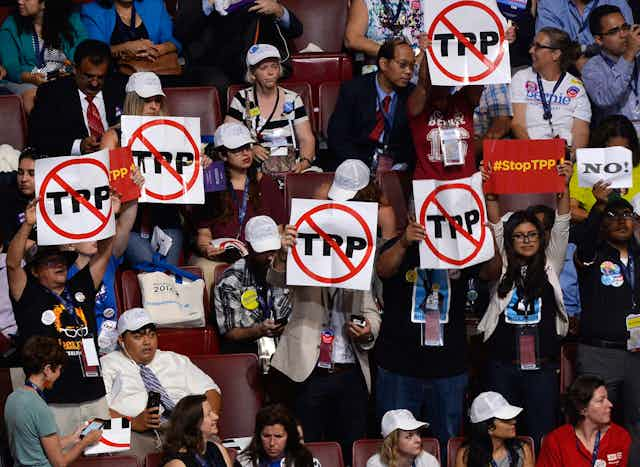President Obama plans to make a last-ditch push to get Congress to approve his signature Trans-Pacific Partnership (TPP) trade deal by urging senators to pass it in a lame-duck session after the election. The chances of that happening appear slim at best, however. Senate Majority Leader Mitch McConnell has already indicated he won’t bring it up for a vote.
Trade has been at the heart of this presidential campaign. Donald Trump has promised to scale back both trade and immigration significantly. Hillary Clinton used to support the deal, but a tough primary contest with Bernie Sanders – who has opposed most recent trade agreements – persuaded her to switch sides.
So unless someone changes his or her mind, the TPP doesn’t stand much of a chance.
Here’s a look back at some of the stories The Conversation has published in recent months on the TPP. How did we get here? What could the end of the TPP mean?
The right turns against trade
Had any other candidate won the Republican nomination, the TPP’s future would probably be a lot more secure. The GOP has – for the past few decades at least – been a champion of free trade.
Donald Trump, in contrast, has repeatedly attacked the TPP, arguing it will destroy millions of jobs and cede U.S. sovereignty to foreign bodies. But is he right? Economists Greg Wright of the University of California, Merced and Emily Blanchard of Dartmouth examined the evidence behind these claims and found them wanting.
“Relative to previous trade agreements that the United States has signed, the TPP is expected to have a large impact in areas in which the U.S. has a strong comparative advantage – especially digital trade, agriculture, and tradeable services – which means that many of the new jobs will be good ones.”
Anticipating the current challenges, back in March political scientist Charles Hankla of Georgia State asked whether free trade and the TPP would be able to survive the rise of Trump and his “new right” movement. He argued that his election would lead not only to the death of the TPP but also would “call into question America’s basic commitment to international cooperation.”
“If the United States, as the primary guarantor of the liberal economic order, is unwilling to stand behind it, who will?”
What’s wrong with TPP?
One of the reasons liberals have been suspicious of the TPP is the investor-state dispute settlement, which allows foreign investors to sue governments over discriminatory and abusive practices, such as unreasonable government seizure of assets. Peter Yu, a law professor at Texas A&M, writes that improvements can still be made to the ISDS provision. Perhaps that could convince some of them it’s worth saving.
“The ISDS mechanism in the TPP contains many new and constructive safeguards. Yet, these safeguards should only be the beginning. If the wide public concerns about ISDS are to be alleviated, policymakers should consider additional complementary reforms.”
Rachel Rothschild, who researches the history of environmental science and diplomacy, argues the TPP has many other “glaring deficiencies,” including poor protection for the environment and food safety. But its most significant – and rarely discussed – drawback is that it departs from a half-century of progress tying environment and human rights to major diplomatic agreements on nuclear weapons and Soviet influence.
“There are certainly important differences between negotiations on trade and those on nuclear weapons and Cold War boundaries. But the larger lesson from Helsinki and other 20th-century agreements – that the best strategic diplomacy also pursues social, economic and environmental justice – is absolutely applicable to the TPP today.”
Glimmer of hope?
While the GOP’s turn against trade has been most surprising, liberals have long been more skeptical of trade, with Sanders’ campaign giving voice to many who viewed Clinton as too cozy with big business.
Dartmouth’s Blanchard, however, contends progressives like Sanders and Elizabeth Warren should get on board the free-trade train and save the beleaguered TPP trade deal from collapse.
“The TPP is less about tariffs and more about creating a coherent global code of conduct for how firms do business in the world. Done right, the agreement would bring important new policy priorities to the negotiating table. It would be a shame to let this chance pass us by.”
But regardless of whether TPP passes or not, U.S. trade with the rest of the world has been declining for years, in part because of our reluctance to enter into regional trade agreements, writes Tomas Hult, an international business professor at Michigan State. That has meant we face higher tariffs than many other countries – a problem that the TPP was supposed to help remedy.
“These regional trade agreements, when the U.S. is not involved, create barriers and constraints that have an effect on market opportunities and profits of U.S. companies. It is common to see tariffs that are five times higher in foreign markets than the U.S. average.”
Who would win if TPP dies?
Finally, if the TPP does wither away, who stands to gain the most? In a word, China.
Nicholas Ross Smith of the University of Auckland explains how failure to ratify the TPP will make China’s own regional trade agreement much more likely to succeed.
“China’s motivation for the [Regional Comprehensive Economic Partnership (RCEP)] is similarly about maximizing its power. However, whereas the United States appears motivated because of its declining power, China’s motivation clearly stems from its rising power. The RCEP seems designed to help anoint China as the regional leader of Asia at the expense of the United States.”
This article was amended to include Rachel Rothschild’s article.

